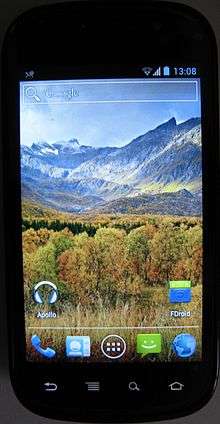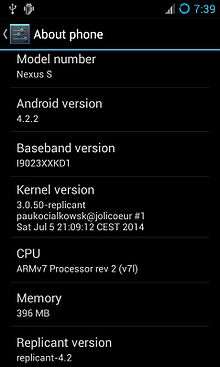Replicant (operating system)
 | |
| Developer | Paul Kocialkowski[1] |
|---|---|
| OS family | Unix-like |
| Working state | Current |
| Source model | Free software |
| Initial release | Mid-2010 |
| Latest release | 4.2 0004[2] (September 2, 2015) [±] |
| Package manager | APK |
| Kernel type | Monolithic (Linux kernel) |
| Userland | Bionic C library,[3][4] mksh shell,[5] native core utilities with a few from NetBSD[6] |
| License | Apache License 2.0, GNU GPLv2, and various other licenses |
| Official website |
www |


Replicant is a free and open source operating system based on the Android mobile platform, which aims to replace all proprietary Android components with free software counterparts.[7] It is available for several smartphones and tablet computers.[8]
The name Replicant is drawn from the fictional replicant androids in the Blade Runner movie.[7] Replicant is sponsored and supported by the Free Software Foundation.[7]
History
The Replicant project started in mid-2010 with an effort to consolidate various initiatives attempting to produce a fully free-as-in-freedom Android derivative for the HTC Dream. The original team consisted of Bradley M. Kuhn, Aaron Williamson, Graziano Sorbaioli and Denis ‘GNUtoo’ Carikli.[9] The project quickly led to the writing of replacement code for the non-free parts that were required to make the HTC Dream functional. The first component to be replaced permitted audio to work without a proprietary library. Replicant originally provided its own FOSS application repository, which was later replaced by F-Droid.[10][11][12]
The Radio Interface Layer, software that handles communication with the modem, was replaced by free code, thus making the telephony part usable. A library handling the GPS was then adapted from free code that was originally written for another phone and permitted the HTC Dream to have GPS working with Replicant.[12]
Early versions of Replicant were based on the Android Open Source Project code, while versions 2.2 (April 2011) and later use CyanogenMod as their base, in order to make supporting more devices easier.[13][14]
As development continued, many members of the original Replicant team retired from the project, making Denis "GNUtoo" Carikli the only remaining member from the original team still actively working on the project. In April 2011, Paul Kocialkowski decided to get involved with the project and gradually became the main Replicant developer, after successfully porting it to the Nexus S and Galaxy S devices.[1][15]
Replicant is sponsored and supported by the Free Software Foundation,[7] which also hosts Replicant's source code.[16]
Releases
The following table lists major releases of Replicant:
| Version | Release date | Based on | Notes | ||
|---|---|---|---|---|---|
| 2.2[17] | 26 April 2011 | N/A | N/A | ||
| 4.0 | 16 November 2012 | Android 4.0 "Ice Cream Sandwich" | Five updates have been released; the last one, 0005, was released on October 1, 2013.[18] | ||
| 4.2[19][20] | 2 September 2015 | CyanogenMod 10.1, based on Android 4.2 "Jelly Bean" | Four updates have been released; the most recent one, 0004, was released on September 2, 2015.[2] | ||
| 6.0 | TBA | CyanogenMod 13.0,[21] based on Android Marshmallow/AOSP 6.0.x | "At Replicant, things are moving again: Replicant is being updated from Android 4.2 to Android 6.0 by Wolfgang Wiedmeyer. [..] This work is currently being done for the Galaxy S 3 (I9300)."[22] | ||
| Legend: Old version Older version, still supported Latest version Latest preview version Future release | |||||
Security
In March 2014, Replicant developers found and closed a vulnerability present in a wide range of Samsung Galaxy products that allowed the baseband processor to read and write the device's storage,[23] sometimes with normal user privileges and sometimes as the root user depending on device model. Replicant's lead developer Paul Kocialkowski claimed it was a backdoor,[24][23] but this was contested by Dan Rosenberg, a senior security researcher at Azimuth Security, who said there was "virtually no evidence for the ability to remotely execute this functionality".[25]
Development
On January 3, 2013, the project released Replicant 4.0 SDK as a fully libre replacement to Android SDK.[26] The Replicant SDK was released in response to Google updating the license for add-ons and binaries under a proprietary agreement.[27]
Hardware support
Supported devices
Scope of the Replicant project has been gradually expanded to include support for new devices, starting with the Nexus One, Nexus S and Galaxy S. As of January 2014, the following devices are supported, with Wi-Fi and Bluetooth requiring proprietary firmware in order to work:[8]
| Device | Device Class | Codename | Replicant version | 2D graphics | 3D graphics | Sound | Telephony | Mobile Data | NFC | GPS | Sensors | Camera | Wi-Fi | Bluetooth |
|---|---|---|---|---|---|---|---|---|---|---|---|---|---|---|
| Nexus S | Smartphone | crespo | 4.2 | Yes | No | Yes | Yes | Yes | Yes | No | Yes | Yes | Proprietary | Proprietary |
| Samsung Galaxy S | Smartphone | galaxysmtd | 4.2 | Yes | No | Yes | Yes | Yes | N/A | No | Yes | Yes | Proprietary | Proprietary |
| Samsung Galaxy SII | Smartphone | galaxys2 | 4.2 | Yes (fast) | No | Yes | Yes | Yes | No | No | Yes | Yes | Proprietary | Proprietary |
| Samsung Galaxy Note (original) | Smartphone | n7000 | 4.2 | Yes (slow) | No | Yes | Yes | Yes | No | No | Yes | No | Proprietary | Proprietary |
| Galaxy Nexus | Smartphone | maguro | 4.2 | Yes | No | Yes | Yes | Yes | Yes | No | Yes | No | Proprietary | Proprietary |
| Samsung Galaxy Tab 2 (7.0) | Tablet computer | p3100 | 4.2 | Yes (fast) | No | Yes | Yes | Yes | N/A | No | Yes | No | Proprietary | Proprietary |
| Samsung Galaxy Tab 2 (10.1) | Tablet computer | p5100 | 4.2 | Yes (slow) | No | Yes | Yes | Yes | N/A | No | Yes | No | Proprietary | Proprietary |
| Samsung Galaxy SIII | Smartphone | i9300 | 4.2 | Yes | No | Yes | Yes | Yes | Yes | No | Yes | Yes (back) / proprietary (front) | Proprietary | Proprietary |
| Samsung Galaxy Note 2 | Smartphone | n7100 | 4.2 | Yes | No | Yes | Yes | Yes | Yes | No | Yes | Yes (back) / proprietary (front) | Proprietary | Proprietary |
| Goldelico OpenPhoenux GTA04 | Smartphone | gta04 | 4.2 | Yes | No | Yes | Work in progress | Work in progress | N/A | Yes | Work in progress | Work in progress | Proprietary | Proprietary |
Likely additions
Additional target devices are evaluated, based on the suitability of their hardware platforms and required device drivers; as of January 2014, devices listed below are not yet supported, and porting Replicant to them is only in consideration.[28]
| Device | Codename | Replicant Version |
|---|---|---|
| Nexus 10 | manta | 4.2 |
In November 2013, it was announced that Replicant could work on a Fairphone device and that the bootloaders may even be free software. The Fairphone team seemed "definitely interested" in helping to get Replicant ported to the device.[29] In December 2014, Fairphone admitted that it had failed to convince chipset vendor MediaTek to open up the source code for first-generation Fairphones.[30]
Rejected devices
Based on either the unsuitability of their hardware platforms or the lack of available free software drivers, porting Replicant to the devices listed below has been considered and rejected.[28]
| Device | Possibility | Reason |
|---|---|---|
| Galaxy Tab 8.9 | Unlikely | Tegra slowness |
| Nexus 7 (all versions) | Possible but unlikely | Too many proprietary drivers[31] |
| Nexus 4 | Very unlikely | Too many proprietary drivers |
| Motorola Defy | Impossible | Kernel is signed |
See also
References
- 1 2 "People - Replicant". Redmine.replicant.us. Retrieved 2013-09-30.
- 1 2 Paul Kocialkowski (2 September 2015). "Replicant 4.2 0004 images release". replicant.us. Retrieved 2 September 2015.
- ↑ "Replicant". replicant.us.
- ↑ "android/platform/bionic/".
- ↑ "android/platform/external/mksh/".
- ↑ "android/platform/system/core/toolbox/".
- 1 2 3 4 McAllister, Neil (26 July 2013). "FSF passes collection plate for free Android clone Replicant". The Register. Retrieved 23 January 2014.
- 1 2 "Replicant Status". redmine.replicant.us. Retrieved 2015-03-28.
- ↑ "Replicant: distribution Android 100% libre". LinuxFr.org. September 20, 2010. Retrieved 2013-09-30.
- ↑ Puttergill, Rowan (3 October 2011). "Replicant: Making Android truly free". Memeburn. Burn Media.
- ↑ Currie, Andrew (24 August 2011). "F-Droid, the Android app store for freedom beards. | Open attitude". Open attitude. (Blog). Retrieved 2013-09-30.
- 1 2 Par aKa (10 October 2011). "Le projet Replicant ou Android totalement libre présenté par PaulK". Framablog. Retrieved 2013-09-30.
- ↑ Manuel Jose (July 2013). "A Fully Free Android based Mobile OS? FSF is Aiming for the Skies with Replicant Project". techdrivein.com. Retrieved 2014-01-02.
- ↑ Rohan Pearce (March 10, 2012). "Replicant developer interview - Building a truly free Android". techworld.com. Retrieved 2014-01-02.
- ↑ "Replicant developer interview - Building a truly free Android - Interview - Techworld.com". Features.techworld.com. Retrieved 2013-09-30.
- ↑ Kocialkowski, Paul (July 1, 2015). "Replicant source code hosting and RMLL 2015". Replicant.
- ↑ "Replicant 2.2 SDK Available". Replicant. 26 April 2011. Retrieved 25 January 2014.
- ↑ Paul Kocialkowski (1 October 2013). "Replicant 4.0 0005 images release". Replicant. Retrieved 2013-10-23.
- ↑ "Replicant". replicant.us.
- ↑ Paul Kocialkowski (2 September 2015). "Replicant 4.2 kicks out!". Replicant. Retrieved 24 January 2015.
- ↑ "Replicant 6.0, at least for the Samsung Galaxy S3". Retrieved 6 September 2016.
SELinux is running in enforcing mode (also in recovery mode).[..]
line feed character in
I was able to get the Samsung-RIL and libsamsung-ipc code updated. [..]
Compiled images if you can't or don't want to build it yourself (build date: 25.3.16) [..] replicant-6.0.zip|quote=at position 70 (help) - ↑ "Replicant 6.0 early work, upstream work and F-Droid issue Replicant". replicant.us. 8 August 2016.
- 1 2 Kocialkowski, Paul (12 March 2014). "Replicant developers find and close Samsung Galaxy backdoor". FSF's blog. Free Software Foundation. Retrieved 19 September 2014.
- ↑ Paul Kocialkowski. "Samsung Galaxy Back-door". Replicant Wiki. Retrieved 5 July 2014.
- ↑ Goodin, Dan (14 March 2016). ""Virtually no evidence" for claim of remote backdoor in Samsung phones". Ars Technica. Condé Nast. Retrieved 4 September 2016.
- ↑ "Replicant 4.0 SDK release | Replicant project". Replicant.us. January 3, 2013. Retrieved 2013-09-30.
- ↑ "What's up with the Android SDK? - Paul Kocialkowski's coding blog". Code.paulk.fr. January 5, 2013. Retrieved 2013-09-30.
- 1 2 "Targets Evaluation". Replicant. Retrieved 2014-01-02.
- ↑ About the Fairphone, in the official Replicant blog.
- ↑ Our approach to software and ongoing support for the first Fairphones, in the official Fairphone blog.
- ↑ "Nexus 7 2013? - Replicant". replicant.us.
External links
| Wikimedia Commons has media related to Replicant. |
